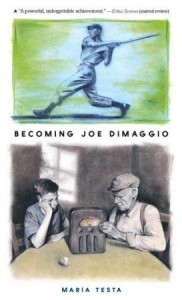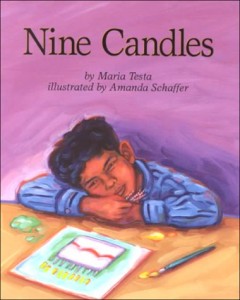LETTERS to a PRISONER, written and illustrated by Jacques Goldskyn This simple but exquisite picture book is wordless. What beautiful irony! The book’s images slowly show us a parent and child protesting. The parent is arrested, jailed, and placed in…
Category: Social Issues – Incarceration
The Warden’s Daughter
Guest post by Padma Venkatraman THE WARDEN’S DAUGHTER By Jerry Spinelli Cammie, the protagonist of Jerry Spinelli’s latest novel, lives in a flat adjoining the county prison. Her mother dies in the act of saving Cammie’s life when Cammie…
The Human Cost of the International Drug War: A Review of An Uninterrupted View of the Sky
Young and Wrongly Accused
Years ago, my husband and I saw the documentary Paradise Lost: The Child Murders at Robin Hood Hills, about three teenage misfits in West Memphis, Arkansas who were accused—and then convicted—or the grisly murder of three eight-year-old boys. Two of…
Human Rights & Children’s Books: USBBY & PEN
United States Board on Books for Young People, USBBY, and International Board on Books for Young People, IBBY, provide an excellent source of information, reviews, and lists of outstanding international books – an international celebration of diversity. Each year…
Maria Testa Gives Voice to Children of Imprisoned Parents
When I heard about Maria Testa’s book, Nine Candles, I needed it immediately. I was organizing book discussion programs for inmates reading children’s literature at the State Prison for Men in Concord, New Hampshir e. Through the New Hampshire Humanities Council, we offered the program to men participating in the prison’s Family Connections Center to build skills as fathers. Nine Candles tells a story of a young boy who visits his mom in prison. The book was out of print, but in my search, I met the author.
e. Through the New Hampshire Humanities Council, we offered the program to men participating in the prison’s Family Connections Center to build skills as fathers. Nine Candles tells a story of a young boy who visits his mom in prison. The book was out of print, but in my search, I met the author.
In this first post I am privileged to write for The Pirate Tree, I want to write about Maria Testa and two of her books that, in poignant scenes sparingly told, bring readers into the experience of a child with a parent in prison. The books are pertinent today at a time that the U.S. Attorney General Eric Holder is lending his power to the fight for prison reform.
“It is important that the children of imprisoned parents do no feel alone,” Testa wrote in 1996 in her author’s note to Nine Candles, “and that they  see their parents as often as possible.” Since 1996, the number of people incarcerated has steadily increased due to mandatory minimum sentencing. Today 2.7 million American children have an incarcerated parent, most for nonviolent crimes. 1 in 28 children have a parent in prison. Twenty-five years ago, the rate was 1 in 125. (The Pew Charitable Trusts.)
see their parents as often as possible.” Since 1996, the number of people incarcerated has steadily increased due to mandatory minimum sentencing. Today 2.7 million American children have an incarcerated parent, most for nonviolent crimes. 1 in 28 children have a parent in prison. Twenty-five years ago, the rate was 1 in 125. (The Pew Charitable Trusts.)
As a student at Yale Law School, Testa was director of the Jerome N. Frank Legal Services Organization, a prisoners’ rights organization through which she worked with inmates on legal issues after they were sentenced. “It defined my law school career,” she says. “So many inmates were young, early 20s. They all had young kids.” The children often visited during regular hours when she was there, and she describes the visits as heartbreaking to observe. She also saw “uplifting moments of real joy.”
Testa’s books are significant in their power to show the impact on children of incarceration at a time when U.S. Attorney General Eric Holder has called for reforms in mandatory minimum sentencing and to “allow judges more discretion to determine sentences for low level drug offenses.” Testa asks a fundamental question about our legal system that arises from sentencing mandates: “What does it take to be a judge? If there are strict guidelines, what is the role of the judge?”
As a law student she wrote fiction about families affected by incarceration, short stories. Later, she wrote Nine Candles. In 2002, she wrote the slight and beautiful novel in verse Becoming Joe DiMaggio.
In Becoming Joe DiMaggio, Joseph Paul grows up with passion for DiMaggio and the Yankees whose games he follows with his Papa-Angelo, his grandfather. You hear the backstory through Joseph’s eyes and heart, that his father, who he loves, is in prison. And you understand how the magic of a family’s passion for an Italian-American baseball star can sustain and shape a boy as he grows up missing his father. Testa brings the writing of these stories very close. She tells me, “My father’s father – for 16 of his first 21 years, was in prison.” In Becoming Joe DiMaggio, she is composing her father’s life.
“There’s a pretty good hope,” Testa says, that Nine Candles is being re-released. Becoming Joe DiMaggio is available from Candlewick. Both books give voice to children of imprisoned parents. Testa gives Joseph Paul these closing words:
Look how we have made
our broken hearts soar.
